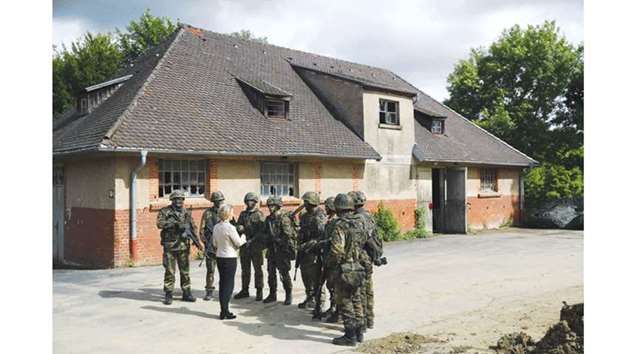The EU has barred its firms from doing business with Crimea since the 2014 annexation, imposed sanctions on Russian individuals and entities, and curbed co-operation with Russia in energy, arms and finance over its role in the crisis in Ukraine.
After it annexed Crimea from Kiev, Moscow threw its support behind a separatist rebellion in eastern Ukraine, which has killed more than 10,000 people and is still simmering.
The EU’s blacklist comprises 150 people and 37 entities subject to an asset freeze and a travel ban. The restrictions are in place until September 15.
“The regular review would normally be the moment to look at who is on the list. In the past, when there were good grounds, we’ve added entries to the list,” an EU official said.
Siemens says it has evidence that all four turbines it delivered for a project in southern Russia had been illegally moved to Crimea.
German government spokeswoman Ulrike Demmer said yesterday the turbines were delivered to Crimea against the terms of the contract and despite high-ranking assurances from Russian officials that this would not happen.
Berlin was currently consulting on what consequences this “unacceptable” operation might have, she said, adding, however, that the onus was on companies to ensure they did not violate the sanctions regime.
The proposed additions to the blacklist could include Russian energy ministry officials and the Russian company that moved the turbines to the Black Sea peninsula, one senior diplomatic source in Brussels said.
Another source said representatives of all 28 EU member states could discuss the matter for the first time in Brussels as soon as Wednesday. The EU needs unanimity to impose or extend any sanctions.
Hungary, Bulgaria, Italy and Cyprus are among EU states which are usually sceptical of Russia sanctions. They take the line that punitive measures have failed to force a change of course by Moscow while hurting European business.
Reuters first reported a year ago on the Siemens case, which has exposed the difficulties of imposing EU sanctions. Siemens, trying to distance itself from the scandal, last week said it was halting deliveries of power equipment to Russian state-controlled customers and reviewing supply deals.
European Commission preparations to retaliate against proposed new US sanctions on Russia that could affect European firms are likely to face resistance within a bloc divided on how to deal with Moscow, diplomats, officials and experts say.
A bill agreed by US Senate and House leaders foresees fines for companies aiding Russia to build energy export pipelines.
EU firms involved in Nord Stream 2, a 9.5bn euro ($11.1bn) project to carry Russian gas across the Baltic, are likely to be affected.
Both the European Union and the United States imposed broad economic sanctions on Russia’s financial, defence and energy sectors in response to Moscow’s annexation of Crimea from Ukraine in 2014 and its direct support for separatists in eastern Ukraine.
But northern EU states in particular have sought to shield the supplies of Russian gas that they rely on.
Markus Beyrer, director of the EU’s main business lobby, Business Europe, urged Washington to “avoid unilateral actions that would mainly hit the EU, its citizens and its companies”.
The Commission, the EU executive, will discuss next steps tomorrow, a day after the US House votes on the legislation, knowing that the US move threatens to reopen divisions over the bloc’s own Russia sanctions.

